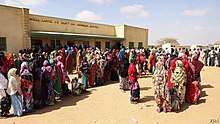2002 Somaliland municipal elections
Municipal elections were held across Somaliland on 15 December 2002. Six political associations fielded 2,368 candidates to contest 379 local council seats in nineteen of Somaliland’s twenty-three electoral districts.[1]

Prior to these elections, local government only consisted of a mayor and a councillor both appointed by the Ministry of Interior by the recommendation of the President.[1] These elections would pave way for the establishment of popularly-elected local governments that were directly responsible to local constituencies.
Political associations
The Constitution of Somaliland stipulated that only three political parties could exist at any one time.[1] As a result, the three associations that gained the largest numbers of local council seats would become the official political parties and enjoyed exclusive legitimacy for the next ten years [1].A political organisation had to achieve 20% of the vote in at least four of Somaliland's six regions in order to become a national party and contest presidential and parliamentary elections.[2]
The contenders that took part in this process included:[1] [3]
- Peace, Unity, and Development Party (Kulmiye) headed by Ahmed Mohamed Mohamoud
- United Peoples' Democratic Party (UDUB) led by President Muhammad Haji Ibrahim Egal
- For Justice and Development (UCID) led by Faysal Ali Warabe
- Sahan led by Dr Mohamed Abdi Gaboose
- Asad led by Suleiman Mohamoud Adan
- Hormood led by Umar Ghalib
Results
Over 440,000 people took part in the country's first municipal elections.[4] Results were announced a week later by the National Electoral Commission, with UDUB, Kulmiye and UCID finishing as the top three parties.
| Party | Votes | % |
|---|---|---|
| United Peoples' Democratic Party | 179,389 | 40.8 |
| Peace, Unity, and Development Party | 83,158 | 18.9 |
| For Justice and Development | 49,444 | 11.2 |
| Sahan | 47,942 | 10.9 |
| Hormood | 40,538 | 9.2 |
| Asad | 39,596 | 9.0 |
| Total | 440,067 | 100 |
| Source: African Elections Database | ||
Aftermath
The elections were viewed largely as a success and was an essential step in the transition from a clan-based formed of governance to a democracy.[5]
Political associations that ranked fourth or lower ceased to exist.[5] Although Sahan passed the threshold of receiving 20% of the votes in at least four regions and UCID did not, it was decided that UCID's higher national vote share qualified it to become the third party, a controversial decision.[5][2]
Councillors from the associations that were dissolved were subsequently required to join one of the newly appointed national parties, UDUB, Kulmiye or UCID.[5]
References
- Hersi, Mohamed Farah (29 May 2015). "Confronting the Future of Somaliland's Democracy: Lessons from a Decade of Multi-partyism and the Way Forward". Africa Portal. Retrieved 18 May 2020.
- "2002 Local Elections in Somaliland". africanelections.tripod.com. Retrieved 22 May 2020.
- Jhazbhay, Iqbal (19–20 August 2010). "Civil Society & their role in Africa's struggle to deepen democracy: Experiences of Somaliland in the Horn" (PDF). African Participatory Democracy Conference, SACP.
- Woldemariam, Richard Bennet and Michael (11 July 2014). "Nurturing Democracy in the Horn of Africa: Somaliland's First Elections, 2002-2005". Nurturing Democracy in the Horn of Africa: Somaliland's First Elections, 2002-2005.
- Renders, Marleen (20 January 2012). Consider Somaliland: State-Building with Traditional Leaders and Institutions. Brill. ISBN 978-90-04-22254-0.